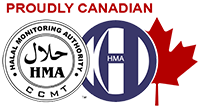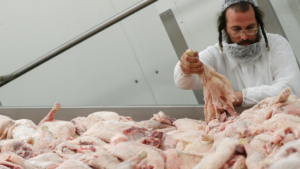The global halal market in Canada is a rapidly growing industry, driven by the increasing Muslim population in the country and the growing awareness of the benefits of halal products among non-Muslim consumers. The Canadian halal market is valued at around $1 billion and is expected to reach $1.5 billion by 2023, driven by factors such as population growth, rising disposable incomes, and increasing globalization. Canadian companies are recognizing this opportunity and are starting to invest in the halal market, with many food and non-food companies now offering halal-certified products. Additionally, several halal certification bodies in Canada certify products as halal, which helps to ensure that products comply with Islamic dietary laws and regulations. Several halal certification authorities in Canada certify products and services as compliant with Islamic dietary laws and regulations. one of them is Halal Monitoring Authority Canada (HMA).
It is a non-profit Toronto halal food organization that certifies food products, ingredients, and services as compliant with Islamic dietary laws and regulations. HMA Canada is dedicated to assuring the Muslim community in Canada that the products and services certified by them are Halal and permissible to consume according to Islamic laws.
HMA also provides halal training and education to industry professionals and companies to help them understand Halal meat Toronto requirements and regulations. Companies that wish to get HMA’s certification need to fill out the application form provided by HMA and submit it along with all the required documents. The global halal meat market is expected to experience significant growth in the next few years, driven by a growing demand for halal products among Muslim consumers worldwide. According to a report by ResearchAndMarkets.com, the global halal meat market is projected to reach $1.3 trillion by 2023, with an expected compound annual growth rate (CAGR) of 5.5% between 2018 and 2023.
One of the main drivers of this growth is the increasing population of Muslims worldwide. According to the Pew Research Center, the global Muslim population is expected to reach 2.2 billion by 2030, which represents a significant market for halal products. Additionally, the growing awareness of the benefits of halal meat, such as being free from harmful chemicals and hormones, is also contributing to the growth of the market. The Asia-Pacific region is expected to be the largest market for halal meat, with countries such as Indonesia, Malaysia, and Pakistan accounting for a significant share of the market. The region is also expected to experience the highest growth rate, driven by the increasing population of Muslims in countries such as India and China.
The report also notes that the halal meat market in Canada is also expected to experience growth, driven by the increasing demand for halal products among Muslim immigrants and a growing awareness of the benefits of halal meat among non-Muslim consumers. Another factor contributing to the growth of the global halal meat market is the rising disposable incomes of consumers in Muslim-majority countries. As incomes increase, so too does the ability of consumers to afford more expensive, high-quality halal meat products. In addition, the growing awareness of the benefits of halal products among non-Muslim consumers is also driving the growth of the global halal meat market. Many non-Muslims are choosing to buy halal meat products due to the perception that they are healthier and of higher quality than non-halal products.
In terms of product segments, the halal meat market is divided into beef, mutton, and poultry. Beef is expected to be the largest segment, accounting for a significant share of the market, followed by mutton and poultry.
The halal meat market also includes a variety of distribution channels, including supermarkets, hypermarkets, and online retailers. Supermarkets and hypermarkets are expected to be the largest distribution channels, accounting for a significant share of the market. However, the report notes that the online retail segment is expected to experience the highest growth rate, driven by the increasing use of e-commerce platforms for purchasing halal products. However, the growth of the global halal meat market may be hindered by factors such as lack of standardization and certification, lack of awareness among consumers, and limited availability of halal meat products in some regions.
Overall, the global halal meat market is expected to experience significant growth in the next few years, driven by a growing demand for halal products among Muslim consumers worldwide and an increasing awareness of the benefits of halal meat among non-Muslim consumers. The Asia-Pacific region is expected to be the largest market for halal meat, with countries such as Indonesia, Malaysia, and Pakistan accounting for a significant share of the market. The report also notes that the halal meat market in Europe and North America is also expected to experience growth, driven by the increasing demand for halal products among Muslim immigrants and a growing awareness of the benefits of halal meat among non-Muslim consumers.




